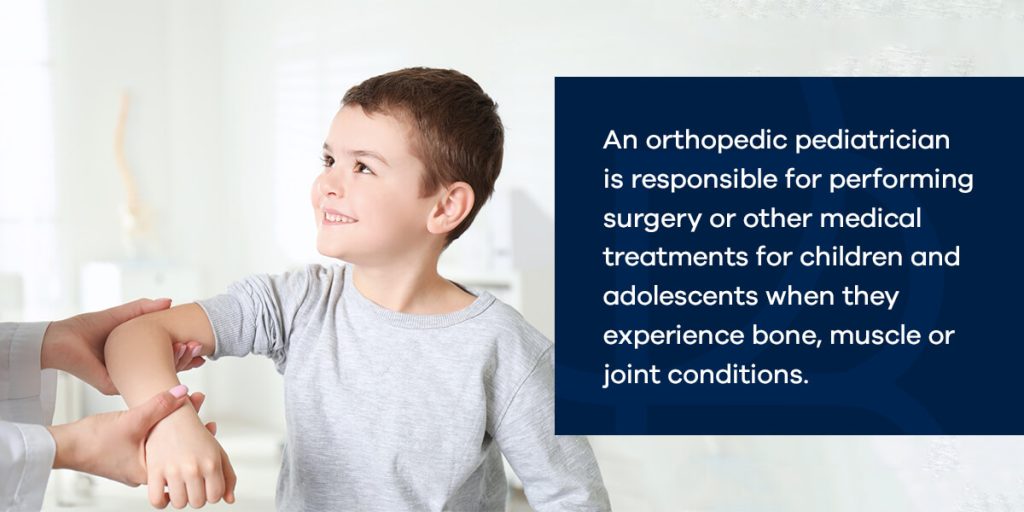
[ad_1]
Caring for a child is at the front of every parent’s mind. Finding the right doctor ensures that your child has access to the appropriate level of care for their condition. Pediatric orthopedics is just one of many medical specialties that handle children’s health care, but it’s essential as part of a comprehensive care plan.
Below, you’ll learn more about what a pediatric orthopedic surgeon does, what their training entails, what they can treat and what you can expect when you bring your child in for their appointment.
What Is Pediatric Orthopedics?
Pediatric orthopedics is a branch of children’s medicine that treats bones, muscles and joints. An orthopedic pediatrician can perform surgery when necessary, but they also perform other treatments, such as braces or casts. An orthopedic pediatrician is involved in treating young children to teenagers when they experience pain, discomfort or abnormalities in their bones, muscles or joints.
Children and teens are still growing, so their bone, muscle and joint buildup are different than that of adults. If a child or teen needs to see an orthopedic pediatrician due to an issue or condition, they’re usually referred to one from their regular pediatrician. Since children experience significant growth until they reach infancy, parents can often mistake their growing pains for an abnormality, so it’s essential first to seek treatment from your child’s pediatrician.

What Does a Pediatric Orthopedic Doctor Do?
An orthopedic pediatrician is responsible for performing surgery or other medical treatments for children and adolescents when they experience bone, muscle or joint conditions. You’ll work alongside your child’s orthopedic doctor to create a treatment plan to help improve your child’s condition.
A pediatric orthopedic doctor has the necessary skills to talk with children about their medical conditions. Children have different physical conditions than adults and often process them differently, making it challenging for a doctor specializing in adult treatment to diagnose. An orthopedic pediatrician typically decorates and arranges their office with children in mind, making them feel more comfortable in a clinical setting. For example, you might find the following items in an orthopedic pediatrician’s office:
- Child-friendly decor
- Children-centered reading materials, toys or entertainment
- Specially-designed equipment suited towards children
Pediatric orthopedic surgeons are also trained to examine children in ways that make them feel more relaxed and comfortable in an environment where they may initially feel anxious or scared. These doctors also have experience talking with family members about their children’s health conditions, which may make them anxious.
Pediatric orthopedic surgeons often work in specialty children’s hospitals, ensuring that children can receive multidisciplinary care from different specialists as needed. Working alongside other specialists, orthopedics pediatricians can help provide quality care that improves the health of children and teens.
What Kind of Training Do Pediatric Orthopedic Surgeons Have?
Pediatric orthopedic surgeons make childcare the primary focus of their medical practice. Pediatricians must complete the required orthopedic training to work with children and teens and their bone, muscle or joint conditions. During their training, education and real-world practice, they learn about the unique healthcare needs of young children and teens and how to care for specific bone, joint and muscle conditions.
Pediatric orthopedic surgeons have to complete specific education and training:
- Graduating from an accredited medical school, which usually takes around four years to complete
- Graduation from a residency program for orthopedic surgery and treatment usually takes around five years.
- Completing a subspecialty training program in pediatric spinal deformity and pediatric orthopedics, usually taking around one year
Pediatric orthopedic surgeons have plenty of training, education and experience to provide quality care to children and teens. These doctors spend plenty of years gaining the expertise they need to provide quality care to their patients.
What Conditions Does a Pediatric Orthopedic Doctor Treat?
If your child struggles with a bone, muscle or joint condition, it’s all the more reason to see a pediatric orthopedist to find relief. Some conditions that pediatric orthopedic surgeons treat include:
- Abnormalities within the growing process
- sports injuries
- Walking problems
- scoliosis
- Joint and bone infections
- broken bones
- Nerve issues
- Foot or ankle surgeries
- Spinal problems
- club foot
A pediatric orthopedic doctor will try to catch various conditions early to ensure quick intervention, preventing the condition from worsening and improving recovery speed. These doctors may work alongside other specialists to diagnose and treat more severe conditions, such as bone tumors, cerebral palsy, muscular dystrophy and juvenile arthritis.
What to Expect at the Pediatric Orthopedist
Each visit you make with your child to an orthopedic pediatrician’s office will be tailored based on age and stage of development. When you take your child to the pediatric orthopedic doctor, you can expect the following:
Medical Evaluations
It can be challenging for children to answer questions about their health, so parents should expect to help their child answer some questions, potentially providing all the information. You can expect to answer typical questions, such as what symptoms your child is expecting and how long they’ve lasted. However, your child’s pediatric orthopedist will also review information regarding their birth, family history and development.
Physical Examinations
Your child’s physical exam will be curated to their specific complaint and age. A toddler won’t be able to answer the same questions or follow instructions the same way that a teenager can.
Your child’s orthopedic pediatrician may have to come up with creative ideas to examine your child’s condition, such as watching them play, walk or handle items like toys. Parents often participate in a child’s physical exam to make their child more comfortable, helping them complete different tasks or having their child sit on their lap while the doctor takes a look at their condition.
testing
Depending on the child’s complaint, the testing can vary to include:
- Blood tests
- Splinting or casting physical injuries
- MRI scans
- ultrasounds
- CT scans
- X-rays
For most treatments, parents are allowed to stay with their children.
treatment
Pediatric orthopedic doctors have an array of skills and knowledge to treat various conditions. These doctors have experience treating conditions without surgery, allowing them to apply casts or bracing for conditions such as hip dysplasia. If surgery becomes necessary, then your child’s doctor will have the training and experience necessary to perform surgery on a growing body.
The treatment plan you create for your child with your orthopedic pediatrician will account for your child’s medical needs and your family’s situation. Depending on where you go, your family may have access to support services to help you navigate your child’s care.

Meet Our Pediatric Orthopedic Doctors
Pediatric orthopedic doctors are an essential part of children’s health care, providing services that help children through their development and treating various injuries or conditions. Ortho Bethesda can help you find the care your child needs to live a healthy life.
Our orthopedic doctors can provide the care your child needs, whether they received a sports injury, experienced abnormalities during their development or developed another condition. We pride ourselves on providing quality care to our patients and giving parents peace of mind that their children will see real improvement in their health. Contact us today to learn more about how we can help or schedule an appointment!
[ad_2]